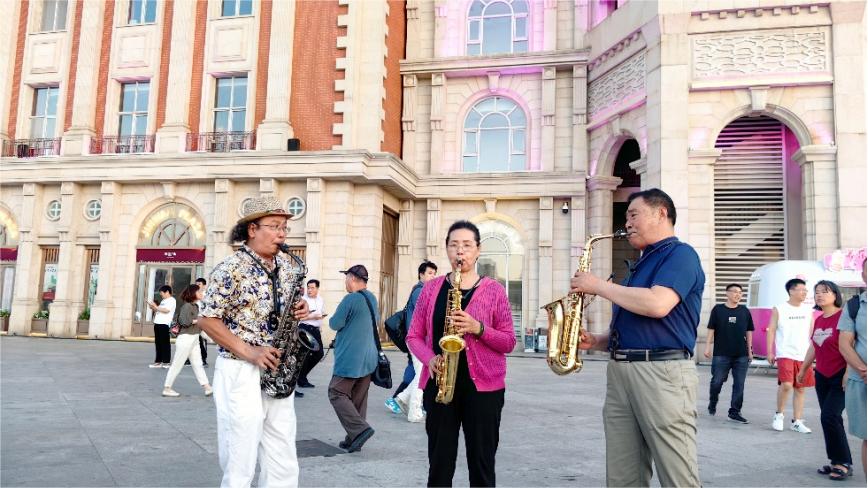Nation helping solve puzzle of global modernization
Erfa Iqbal, a Pakistani civil servant for more than 25 years, recently graduated from Peking University with a doctoral degree in economics. With the governance knowledge she has acquired in China, she will soon return to her position with the government of Pakistan.
Wearing a red gown and an academic cap, Iqbal gave a speech on June 22 at Peking University's centennial auditorium for the commencement ceremony of the Institute of South-South Cooperation and Development. "It feels like a dream," she said.
Established in 2016, the institute aims to strengthen cooperation on experience sharing and capacity building with various countries. Its students are mid- to senior-level officials from developing countries, and the curriculum is focused on economics, politics, and governance.
This year's 35 graduates came from 19 Asian and African countries and were conferred 17 master's degrees in public administration and 18 doctoral degrees in economics. Overall, the institute has trained over 400 students from more than 70 developing countries in governance and administration.
Curious about the nation's rapid development, officials and political parties from developing countries have come to China through various cooperation projects, such as university programs, inter-party exchanges, and short-term visits, to understand the modernization path explored by the Communist Party of China.
Zhao Fengtao, vice-chairman of the China International Development Cooperation Agency, said, "As the world's largest developing country, China continues to increase its resource input into global development cooperation, creating opportunities for world development through its own progress."
In an address at the CPC in Dialogue with World Political Parties High-level Meeting in March last year in Beijing, President Xi Jinping said, "It is the people of a country that are in the best position to tell what kind of modernization best suits them."
"Developing countries have the right and ability to independently explore the modernization path with their distinctive features based on their national realities," said Xi, who is also general secretary of the CPC Central Committee.
China will continue to support and help developing countries in their pursuit of faster development, industrialization, and modernization and offer Chinese solutions and strength for narrowing the North-South gap and achieving common development, he said.
Focusing her research on industrial cooperation with China, Iqbal said, "All the classmates got a sense of what is going on globally, how China is now reshuffling economics around the globe."
"China is making history, and we have been trained by ISSCAD to be part of this process, to fix the jigsaw puzzle, for our respective countries," said Iqbal, who is executive director general of the Board of Investment, Islamabad.
Development miracle
Stevius Mfuko, a Tanzania Airports Authority human resources and administration officer, said: "It was my dream not only to study in China but also to learn about the reform and opening-up initiated by Deng Xiaoping in the 1970s. This marked the start of significant economic reforms, and opening China to foreign trade and investment leading to rapid economic growth and modernization."
Mfuko, who obtained a master's degree in public administration from ISSCAD, said, "We not only learned theoretical concepts in class but also visited Shenzhen, which is a prime example of China's rapid development (as it) transformed from a small fishing village into a major global business and financial center."
"The knowledge and insights gained from China's development experience will enable me to contribute effectively to Tanzania's own development initiatives and apply the lessons learned about economic reforms, infrastructure development, and efficient public administration to help foster sustainable growth and development in Tanzania," he said.
Zhou Yongmei, director of global partnership at ISSCAD, said, "China is indeed a 'shining star' among developing countries in terms of sustainable growth and poverty reduction in the past four decades."
"China's success makes people curious," she said, adding that "if you want to identify a development strategy, China stands out as an inspiration."
Through the study program, foreign students were taken to Shenzhen, Guangdong province, to learn about its development from a fishing village to a megacity. They also traveled to Pingyu in Henan province to learn how the impoverished county became a destination for industries looking to relocate from coastal provinces, where labor costs had become too high.
"It inspired the students to see how such a county, without a solid industrial foundation, realized development," the professor said.
Ethiopia's Government Communication Services Minister Legesse Tulu said China now leads the world in fields such as electronics, vehicles, and renewable energy thanks to its emphasis on innovation.
He gained his position after graduating from Peking University with a PhD, and his job includes providing citizens with government information and enabling them to engage in issues of public interest.
"The ambitious objectives … to improve China's manufacturing capacity and lessen reliance on foreign technology, impressed me," he said.
The country demonstrates its strategic approach to international economic relations through its involvement in global trade, particularly through the Belt and Road Initiative, Tulu said. "It's also impressive how fast the government can change its policy in reaction to economic difficulties," he added.
"I find it significant that the implementation of environmental fees to tackle pollution demonstrates a commitment to sustainable growth," he said.
"These instances highlight China's economic policies' depth and breadth, as well as their effects on sustainability and the world economy."
Long-term governance
The success of China's development has led people around the world to study the CPC's long-term governance in China, and how it leads the country to achieve continuous prosperity.
Tulu visited various organizations in China, including the Party school, and interacted with CPC leadership at various levels. He said he found that preserving unity and direction in China requires strong leadership. Tulu added that the Chinese leadership thinks long-term and plans strategically.
"The CPC considers centuries and decades in its thinking. They place a strong emphasis on stability and sustainable development, looking beyond immediate profits," Tulu said.
China's development is guided by Five-Year Plans for specific time periods. They implement the CPC's governance concept, define clear goals, and divide long-term objectives into manageable short-term assignments, he said.
For example, goals for socialist modernization by 2035 were made alongside the 14th Five-Year Plan (2021-25), which also offered recommendations for the next five years, he said. "They illustrate the CPC's capacity to uphold popular will and mobilize support by combining goal and problem-oriented approaches," he said.
Tulu also learned that merit-based promotions are highly valued by the CPC, which helps guarantee competent leadership that can adjust to shifting conditions.
Party discipline is the third critical component of success and entails campaigns against corruption, procedures for holding people accountable, and ongoing assessments, he said.
Reaching out to the public through initiatives like the "mass line" strategy is the fourth aspect, Tulu said. "This motivates public servants to pay attention to citizens' worries, meet their needs, and preserve support from the public," he said.
Joint efforts
Gatwech Koak Nyuon, who works for the government of Jonglei State, South Sudan, said he had learned how a huge section of the population had been lifted out of poverty by the Chinese government, and the economic strategies it had used.
"The agenda for most developing countries is to get out of poverty and to unite, to ensure we become independent in terms of the economy," he said.
Tulu said China uses a variety of planning approaches to handle regional differences and encourage balanced growth. This guarantees that every region contributes to and gains from national development.
The government has prioritized increasing work opportunities for the underprivileged through public welfare jobs, enterprise job creation, labor market collaboration among regions, vocational training, and encouraging entrepreneurship, he said.
"These are lessons that will help us develop our own plans for reducing poverty within the context of our own socioeconomic situation," he said.
Fatou Jobe, senior assistant secretary at Gambia's Ministry of Lands and Regional Governance, said traveling through villages in China she saw that China's development is not a "miracle", but instead the result of a lot of hard work that a great deal of planning went into.
As a food security specialist who did her research in China, Jobe said she was impressed by an agricultural network where companies choose to work with farmers instead of putting them out of business. For farmers who want to retain and work their own land, the companies enter into an arrangement where they promise to buy their produce, which ensures the farmers have a market, she said.
"Such initiatives can prove useful in helping farmers in my country sustain their source of livelihoods, while also improving the food insecurity challenges we face," Jobe said.
"As such, having had the opportunity to witness firsthand the significance of cooperation and planning, I am inspired to make similar recommendations that would encourage dialogue and cooperation between farmers and big companies with the aim of mutual benefit," she added.
Deepening cooperation
President Xi announced in Beijing on Friday a host of steps to better support Global South cooperation. His key policy address was to mark the 70th anniversary of the Five Principles of Peaceful Coexistence.
China will establish a Global South research center, and it will provide 1,000 scholarships under the Five Principles of Peaceful Coexistence Scholarship of Excellence and 100,000 training opportunities to Global South countries in the coming five years.
The nation will also launch a Global South youth leaders program, he said. China will renew the China-IFAD South-South and Triangular Cooperation Facility, and make an additional contribution of $10 million to be used to support the agricultural development of the Global South.
Xi said China has been advocating universally beneficial and inclusive economic globalization, promoting high-quality Belt and Road cooperation, and endeavoring to deliver on the Global Development Initiative.
"Our goal is to benefit all with the opportunity of development, to diversify development paths, to help all nations share development fruits, to encourage common development and prosperity for all countries in the global village, and to turn win-win into a solid consensus," he said.
Iqbal, from Pakistan, said developing countries need to develop according to their own resources, adding that China is on hand to offer support while this happens.
Cooperation programs help the countries involved become more confident, become masters of their own destiny, enable them to plan their own economic growth models, identify priority sectors, and overcome domestic problems, she said. "This is how the world is going to prosper in the future," she said.
Iqbal's son, Mohammad Murtaza, who also works for the Pakistan government, accompanied her to the graduation ceremony in Beijing. She said he is trying to learn more about the Chinese language and Chinese culture.
"I wanted him to see how China is moving forward. I wanted him to see how these classmates from different countries support each other," Iqbal said, adding that "maybe he's a future student for China."
Photos
Related Stories
- Global South is key force for reforming intl order; 2024 expected to be fruitful year for cooperation: Wang
- Interview: COP28 president-designate calls for fairer climate financing for Global South
- Global South confident in building equal, orderly multi-polar world
- Working together to build a modern Global South
- China committed to building a Global South community with a shared future
Copyright © 2024 People's Daily Online. All Rights Reserved.









